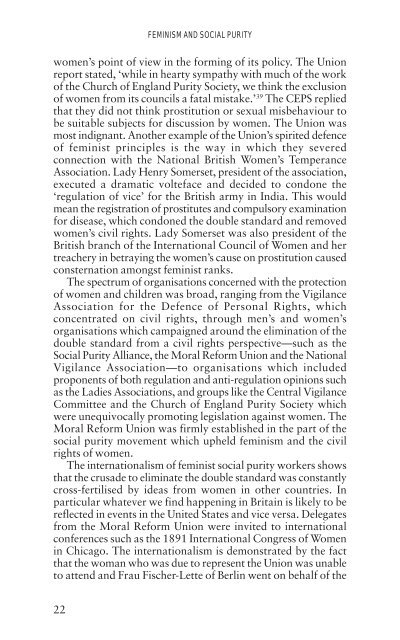The Spinster and Her Enemies - Feminish
The Spinster and Her Enemies - Feminish
The Spinster and Her Enemies - Feminish
Create successful ePaper yourself
Turn your PDF publications into a flip-book with our unique Google optimized e-Paper software.
FEMINISM AND SOCIAL PURITY<br />
women’s point of view in the forming of its policy. <strong>The</strong> Union<br />
report stated, ‘while in hearty sympathy with much of the work<br />
of the Church of Engl<strong>and</strong> Purity Society, we think the exclusion<br />
of women from its councils a fatal mistake.’ 39 <strong>The</strong> CEPS replied<br />
that they did not think prostitution or sexual misbehaviour to<br />
be suitable subjects for discussion by women. <strong>The</strong> Union was<br />
most indignant. Another example of the Union’s spirited defence<br />
of feminist principles is the way in which they severed<br />
connection with the National British Women’s Temperance<br />
Association. Lady Henry Somerset, president of the association,<br />
executed a dramatic volteface <strong>and</strong> decided to condone the<br />
‘regulation of vice’ for the British army in India. This would<br />
mean the registration of prostitutes <strong>and</strong> compulsory examination<br />
for disease, which condoned the double st<strong>and</strong>ard <strong>and</strong> removed<br />
women’s civil rights. Lady Somerset was also president of the<br />
British branch of the International Council of Women <strong>and</strong> her<br />
treachery in betraying the women’s cause on prostitution caused<br />
consternation amongst feminist ranks.<br />
<strong>The</strong> spectrum of organisations concerned with the protection<br />
of women <strong>and</strong> children was broad, ranging from the Vigilance<br />
Association for the Defence of Personal Rights, which<br />
concentrated on civil rights, through men’s <strong>and</strong> women’s<br />
organisations which campaigned around the elimination of the<br />
double st<strong>and</strong>ard from a civil rights perspective—such as the<br />
Social Purity Alliance, the Moral Reform Union <strong>and</strong> the National<br />
Vigilance Association—to organisations which included<br />
proponents of both regulation <strong>and</strong> anti-regulation opinions such<br />
as the Ladies Associations, <strong>and</strong> groups like the Central Vigilance<br />
Committee <strong>and</strong> the Church of Engl<strong>and</strong> Purity Society which<br />
were unequivocally promoting legislation against women. <strong>The</strong><br />
Moral Reform Union was firmly established in the part of the<br />
social purity movement which upheld feminism <strong>and</strong> the civil<br />
rights of women.<br />
<strong>The</strong> internationalism of feminist social purity workers shows<br />
that the crusade to eliminate the double st<strong>and</strong>ard was constantly<br />
cross-fertilised by ideas from women in other countries. In<br />
particular whatever we find happening in Britain is likely to be<br />
reflected in events in the United States <strong>and</strong> vice versa. Delegates<br />
from the Moral Reform Union were invited to international<br />
conferences such as the 1891 International Congress of Women<br />
in Chicago. <strong>The</strong> internationalism is demonstrated by the fact<br />
that the woman who was due to represent the Union was unable<br />
to attend <strong>and</strong> Frau Fischer-Lette of Berlin went on behalf of the<br />
22

















